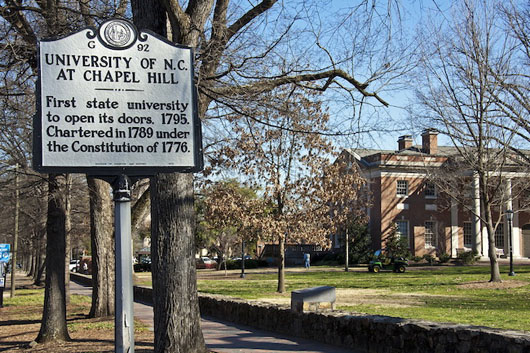by WorldTribune Staff, August 1, 2017
North Carolina’s legislature has passed a campus freedom of expression bill that will prevent college administrators from disinviting speakers some on campus find objectionable and disciplines those who “shut down” the speech of others.
The Restore Campus Free Speech Act passed the NC House 80-31 with 10 Democrats voting in favor and passed the NC Senate 34-11 along strict party lines.

Gov. Roy Cooper has said he will take no action on the legislation.
The legislation is based on the Goldwater proposal, co-authored by Stanley Kurtz, Jim Manley and Jonathan Butcher of Arizona’s Goldwater Institute. The proposal is also under consideration by several other states.
Kurtz, writing for National Review on July 31, said Lt. Gov. Dan Forest was “the guiding force” behind North Carolina’s Restore Campus Free Speech Act.
Forest “deserves great credit for moving it through the legislature,” Kurtz wrote, adding the lieutenant governor and his staff “provided critical early encouragement and support for the approach that eventuated in the Goldwater model bill.”
The bill “ensures that University of North Carolina policy will strongly affirm the importance of free expression,” Kurtz wrote.
Along with preventing administrators from disinviting speakers “whom members of the campus community wish to hear from,” the legislation “establishes a system of disciplinary sanctions for students and anyone else who interferes with the free-speech rights of others, and ensures that students will be informed of those sanctions at freshman orientation,” Kurtz, a senior fellow at the Ethics and Public Policy Center, wrote.
“It reaffirms the principle that universities, at the official institutional level, ought to remain neutral on issues of public controversy to encourage the widest possible range of opinion and dialogue within the university itself.”
Kurtz noted that the law “also sets up a special committee within the UNC Board of Governors to issue an annual report on campus barriers to free expression. This provision draws the Board of Governors into more active oversight of campus free speech and serves as a check on administrative abuse on issues like free-speech zones.”
The North Carolina bill “is substantially weaker than the original Goldwater proposal” in one area, Kurtz said.
“Although the North Carolina law will establish sanctions for students who shut down the speech of others, will protect the due-process rights of the accused, will inform students at freshman orientation of penalties for shout-downs, and will see that the administration of discipline is monitored by the Board of Governors, the provision that would have mandated suspension for students twice found responsible for silencing others was struck.”
Kurtz wrote: “That provision is important for a number of reasons. First, the punishment is just. A student who twice silences visiting speakers or fellow students obviously hasn’t learned a lesson from the initial punishment. Yale’s famous Woodward Report of 1974, the classic statement on campus free-expression, recommended suspension or expulsion after only a single shout-down.
“The Goldwater proposal is mild by comparison. Second, since universities regularly ignore shout-downs or hand out meaningless punishments, the mandatory suspension for a second offense is the only way to prevent schools from undermining the law by handing out wrists-slaps ad infinitum. Finally, when students learn at freshman orientation that state law requires a significant suspension for participation in a second shout-down, this will have a powerful deterrent effect. Without the mandatory suspension for a second offense, the university could conceivably undermine the law through lax enforcement.”
Kurtz noted that Tennessee has also recently passed a campus free-speech bill.
“While the Tennessee law is excellent in many respects, it does not systematically address the issue of discipline for shout-downs. Should the University of Tennessee refuse to discipline shout-downs in the coming years, the limitations of the new law will be evident and a campaign to add discipline provisions will ensue.
“Any state bill can be strengthened in a second legislative round if universities continue to abuse their powers. Campus free-speech legislation is now in play as never before. Administrators will have to take that into account when they decide how to handle free speech. In short, the public has awakened and is actively pushing back against the illiberal assault on speech. That is a silver lining in the current crisis.”
Subscribe to Geostrategy-Direct __________ Support Free Press Foundation
